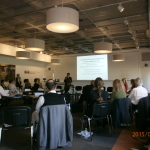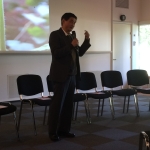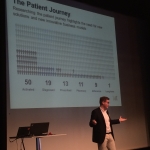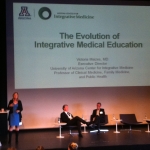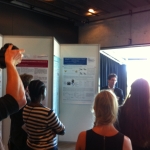- Nordic Policy Roundtable
- Dr. Lixing Lao, University of Hong Kong
- Peter Aksel Villadsen, Senior Director LEO Pharma Center of Excellence Patient Engagement
- Dr. Victoria Maizes, MD University of Arizona Fellowship in Integrative Medicine
- Poster Presentation
Summary of the ECIM 2015 Global Summit on Integrative Medicine and Healthcare
Published Abstracts Online at European Journal of Integrative Medicine (EuJIM)
Published Summary: Journal of Integrative Medicine (JIM), Volume 13 Number 6 November 2015
In September 2015, Nordic Integrative Medicine (NIM), in partnership with the European Society of Integrative Medicine (ESIM), convened the 8th European Congress for Integrative Medicine (ECIM) 2015 Global Summit on Integrative Medicine and Healthcare in Greater Copenhagen, Denmark, to explore the prominent issues that healthcare is facing globally and the scientific evidence for or against integrative medicine (IM) that includes conventional medicine (CM), complementary and alternative medicine (CAM), and traditional medicine (TM).
- Background of the Global Summit
ECIM 2015 Global Summit was inspired by the historical 2009 Summit on Integrative Medicine and the Health of the Public in Washington D.C. hosted by the Institute of Medicine (IOM) and the Bravewell Collaborative. Dr. Woodson Merrell, M.D., Executive Director of the Center for Health and Healing and Chairman of the Department of Integrative Medicine, Mount Sinai Beth Israel Medical Center in New York City, reminded us that the call from 2009 for the need for reconfiguration of healthcare has not changed. He stated that, “Integrative medical care that increases patient satisfaction and decreases the use of costly pharmaceutical and procedure-intensive therapies remains the key to fixing this globally broken system, and yet academic medical centers have only cautiously embraced the integrative healthcare concept. Common perceived hurdles are not only the evidence-basis—something increasingly answered by a near-explosion of quality research—but also practical hurdles, especially legal and financial.”
Important points articulated by the 2009 Summit faculty were: (1) The progression of many chronic diseases such as cardiac disease and cancer can be reversed and sometimes even completely healed by making lifestyle modifications. (2) Genetics is not destiny and gene expression can be turned on or off by nutritional choices, levels of social support, stress reduction activities such as meditation, and exercise. (3) Our environment influences our health—the environment outside one’s body rapidly becomes the environment inside the body. (4) Improving our primary care and chronic disease care systems is paramount. (5) The reimbursement system must be changed to encourage healthcare providers to focus on the health outcomes of their patients. (6) Changes in education will fuel changes in practice. (7) Evidence-based medicine is the only acceptable standard. (8) A large national demonstration project that substantiates the clinical and cost-effectiveness of an integrative approach to care is needed.
According to the Bravewell Collaborative, “IM is founded on the premise that health is a state of physical, emotional, mental, social and spiritual wellness, which enables an engaged relationship with life. When health in its fullest sense is the goal of the healthcare system, then it naturally follows that all the influencing factors, not just the physical problems, need to be addressed in the care process.” As Dr. Harvey Fineberg, MD PhD, former President of IOM and host of the 2009 Summit stated, “One of the most important reasons to have this Summit is to focus attention on healthcare for the whole person.”
- Participants of the Global Summit
More than 30 nations and 40 universities represented over 100 scientific presentations. Health practitioners, scientists, policy experts, academic and industry leaders and patient advocates from across the globe came together to share their research and experience, and suggested how the principles and practices of IM could help patients, providers and payors. “As the role of governments, as payer, regulator, and market-shaper, is growing, many governments, such as the United States, China, India, South Africa, Mexico and Rwanda, are introducing broad reforms to healthcare systems,” said Global Summit Opening Keynote, Dr. Victor Dzau, MD President of the National Academy of Medicine (formerly IOM), Washington D.C., “There is a need for earlier detection and intervention and so healthcare systems must change and focus on integration, prevention of disease, health and wellness, treating the whole person, and becoming more community-based.”
A pre-summit policy roundtable report delivered on behalf of Professor Dr. Negoslav P. Ostojic, CEO, Executive Director of the United Nations European Center for Peace and Development (UN ECPD), declared a call for strategic policies in support of integrated healthcare that would include a vision for setting up “an IM department in at least one hospital in every European country.” The report continued by stating that, “Political will and support will be essential in that process as hospitals and officials would not change standard protocols and practice without push from the outside and above.” UN ECPD has Diplomatic Status as part of the academic system of the United Nations with specific tasks and actions for sustainable development, education, and research. The report elaborated on the need for smart strategic planning, management and promotion in the following fields. (1) Sustainable Development: Environmental and human health is not just the absence of disease rather it is measured by outside factors as well as inside factors. Because “where we live, and what we do, have, eat, drink matters,” environmental and health agencies need to work together to create immediate solutions. (2) Education: Quality-standardized education is crucial to obtain a sufficient number of present and future TM/IM health providers. Most health professionals are not educated about TM/CAM/IM, and statistics suggest that 30% wish to learn relevant basics. There are few education curricula available in most European Union countries and most governing bodies are not in favor of any change. (3) Shared Knowledge/Databases: Evidence suggests that there are 1260 herbal drugs in the national essential drug list in China and yet out of 22 countries (16% of 135 total who include herbal medicines on their respective national essential drug list), the majority of the countries had listed only one to 10 herbal medicines. It takes thousands of years to develop that level of ancient medicinal knowledge and yet we hesitate to use it. (4) Research: Research is important but must be balanced. There exists a constant push for research and little use of its results. European researchers already have some evidence/results for the IM approach towards better health & prevention that can be applied to patient-care.
- Theme of the Global Summit
The theme of the Global Summit was “Exploring the Evidence-Base for Integrated and Sustainable Research, Healthcare and Workforce for Patients” that, for the first time, truly placed the patient at the center of the congress and offered an innovative, solution-driven platform for physicians and healthcare practitioners, researchers and students, politicians and patients, to collectively exchange and discuss research and research findings in the field of IM and collectively work on the vision and science, economics and education for optimal healthcare. There were moderated academic and scientific sessions and open-forum expert panel discussions with the opportunity for delegate feedback that included two sponsored ReThinkBox Sessions: Integrative Oncology and Patient Engagement.
A powerful post-humous video keynote by patient expert, Michael Hay, former Creative Director for IKEA Global Communications, delivered important directives to city mayors and doctors: “In 30 years, 70% of the world’s population will live in cities, so in the future, city mayors will become more important than politicians and the really visionary mayors will be the real leaders in sustainable development. There are so many options for patients and doctors. By working together and by opening up from both sides, you can create a team, which is going to make life better for both the doctors and the team treating the patient and the patient, who starts feeling less like a patient and more like a human being, who is getting help. Anything that can give hope every time you meet, without distorting reality, is worth so much.”
Key questions that were addressed at the Summit included: Can IM provide high-quality yet cost-effective care for global health? Can IM research offer solutions for global health that are truly sustainable? Can IM improve patient-centered healthcare through an integrated workforce?
Overall, it was an excellent weekend. I thought the discussion at the Nordic Policy Roundtable was frank and stimulating. The ECIM summit program was comprehensive and participatory. Your passion and leadership was evident. I hope that your effort will catalyze the “movement” that is needed to move the field forward.
Victor Dzau, President of National Academy of Medicine
United States of America
Dr. Woodson Merrell, Mt. Sinai Beth Israel Hospital
Prof. Lars Ole Bonde, Aalborg University
Thank you so much for inviting me to such an interesting and stimulating conference. I really enjoyed it, as well as visiting Denmark for the first time! What a beautiful and friendly place you live in! You did a great job of organising the conference, it must have been very hard work.
Merlin Willcox, Oxford University
United Kingdom
I would like to thank you for the very nice ECIM congress in Helsingor!
It was all very nicely organized!
It was the first time I came to this congress and I am very willing to continue this path of integrative medicine in my practice of Neurology.
If I can help in any way to promote integrative medicine, people can contact me.
Sincerely yours,
Dr. Els Janssens, neurologist
Belgium
I would like to express my sincerely gratitude for your invitation to the very informative and exciting Summit in Copenhagen. I truly enjoyed meeting with many experts in the field of Integrative Medicine in which you have been playing very important role to pull all parts together in a cohesive and united force. What you are doing is extremely important for developing integrative medicine in Europe.
Lixing Lao, University of Hong Kong
China


